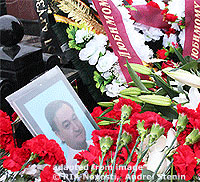Moscow forestalled U.S. Magnitsky Act by its own law on NGO as foreign agents – analyst

MOSCOW. Nov 19 (Interfax) – Moscow forestalled the adoption of the so-called Sergei Magnitsky Rule of Law Accountability Act in the U.S. by enacting the law on NGOs acting as foreign agents, which is quite painful for Washington, but it should be prepared to see a number of European Union countries considering bills analogous to the one just passed by the U.S. House of Representatives, says Alexei Makarkin, a first vice president of the Center of Political Technologies think tank.
“Moscow has already given an asymmetric response. I mean the law on NGOs acting as foreign agents. This is quite unpleasant for the Americans,” Makarkin told Interfax on Friday.
Russia’s response can be only asymmetric, he said.
“In considering response steps, Russia can act only asymmetrically, because compiling a blacklist of U.S. officials seeking (Russian) visas appears not very efficient. If, say, Moscow compiles such a list of those who have some relation to the Viktor Bout case or other cases, this will not work in practice. These officials are unlikely to have any interest in Russia. As concerns a lot of Russian elite members, the situation is different. Many of them are interested in traveling to the U.S. and have real estate in the West,” he said.
Makarkin suggested that a number of EU countries could pass similar bills.
“The Brits are really likely to do so. As for Europe on the whole, the position of any country that is a member of the Schengen accords is significant here. Estonia earlier imposed certain restrictions on some Russians, and they had problems over this in other countries of the Schengen area as well. At the same time, as concerns the EU, it should be born in mind that there are countries interested in maintaining good relations with Russia as well, and therefore they will do all they can to refrain from such drastic restrictive measures,” he said.
The tying of the bill repealing the Jackson-Vanik Amendment to Sergei Magnitsky’s death is a political move based primarily on The Russian Foreign Ministry said earlier that Russia had already considered various responses in case the U.S. Congress passed the Magnitsky Act. “We certainly know it. We talked about this at all stages of the debate on the so-called Magnitsky legislation. I can confirm that our response will be tough, but not necessarily symmetrical,” Deputy Foreign Minister Sergei Ryabkov told Interfax earlier.
Russian Foreign Ministry spokesman Alexander Lukashevich said Russia’s response to the passage of the Magnitsky Act in the U.S. would be tough. “We will certainly not leave without consequences an actual anti-Russian initiative on imposing visa and financial sanctions against our country simultaneously with the repeal of the Jackson-Vanik Amendment,” Lukashevich said at a news conference in Moscow on Thursday. “We will have to respond, and our response will be tough,” he said. Russia’s reaction will depend on “the final form of this unfriendly and provocative step,” he said.
The list of Russian officials who could fall under U.S. visa sanctions in line with the Magnitsky Act had earlier been compiled by U.S. Senator Benjamin Cardin. The U.S. Department of State earlier put a number of Russian officials the U.S. believes were involved in the criminal prosecution of Hermitage Capital lawyer Sergei Magnitsky on the visa blacklist. It includes, in particular, a number of special services officials, policemen, prison wardens and doctors, prosecutors, tax auditors, and tax inspectors.
Russia was outraged by this list, saying that this in fact meant pressure on the Russian judicial system. It compiled its own visa blacklist of 11 U.S. officials not eligible for Russian visas.
